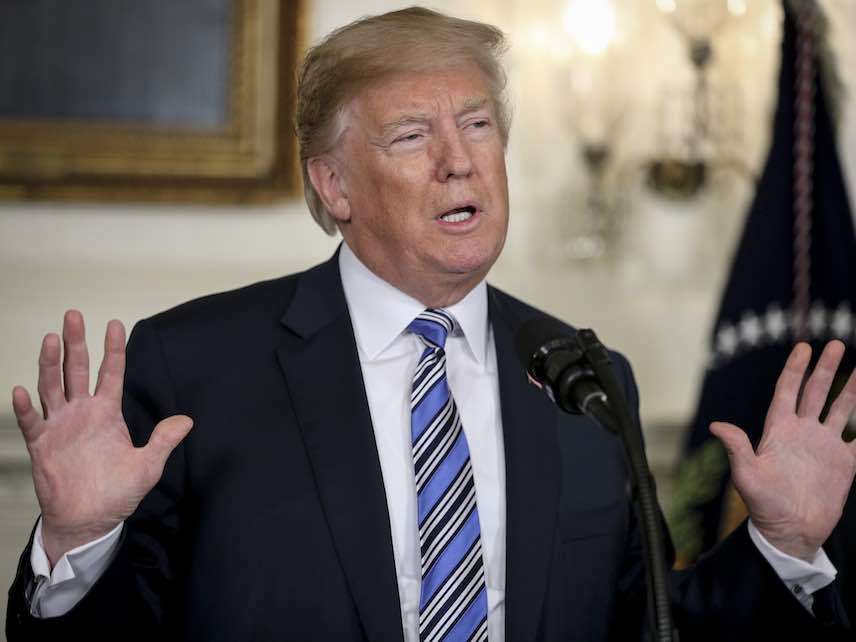Donald Trump Calls the Campus Free Speech Crisis 'Highly Overblown'
"I think the numbers are actually much different than people think."

President Donald Trump stunned many in the media yesterday when he opined that the so-called campus free speech crisis is "highly overblown"—and he has a point, though I ultimately think he's wrong.
Trump probably doesn't realize it, but this actually puts him in the same category as left-of-center pundits like Matt Yglesias and Noah Berlatsky, who have long argued that these campus controversies do not reflect a systemic and increasing leftist hostility to free speech.
Trump's comment came while fielding a question from Charlie Kirk, the president of Turning Point USA, during a White House forum on millennial Republican issues. Kirk, whose group is a major player in the campus speech battles, asked Trump, "What advice do you have for young patriots and conservatives on campus that support your agenda that are being ridiculed and silenced because of administrations that are clamping down on free speech?"
Trump responded:
I think the numbers are actually much different than people think. I think we have a lot of support. If they have one campus or two campuses, and we know what they are, it gets all the publicity. We have campuses where you have a vast majority of people that are perhaps like many of the people in this room, you could call it conservative, you call it whatever you want, but there are people that want free speech.
If you look [at] what's going on with free speech, with the super-left, with Antifa, with all of these characters—I'll tell you what, they get a lot of publicity, but you go to the real campuses and you go all over the country, you go out to the Middle West, you go out even to the coast in many cases, we have tremendous support. I would say we have majority support. I think it's highly overblown. Highly overblown.
If Kirk was surprised by this remark, he didn't show it, instead volunteering that he "completely agreed" with the president.
ThinkProgress had some fun with this turn of events. "Trump attends event about campus political correctness crisis, accidentally admits it doesn't exist" was the headline.
Trump, of course, made political correctness a central issue during the campaign—which arguably played a role in his victory—so it may seem a little weird for him to pull his punches now.
But let's not forget that Trump is really bad at acknowledging how many people dislike him. He has claimed, for instance, that he would have won the popular vote (despite losing it by nearly 3 million votes) if illegal immigrants' votes were discounted. I suspect that Kirk's framing of the question put political correctness in tension with Trump's ego; unsurprisingly, ego won out.
That said, Trump is right that many college campuses across the country are home to students whose politics are far less radical than the activists of Reed, Middlebury, Oberlin, Yale, Berkeley, etc. And even the most radical campuses include thousands of students with no interest in disinviting or shouting down speakers.
As I wrote in my recent piece explaining why I think there is a campus speech problem—if not a full blown crisis—the real question is whether the small subset of speech-hostile students have been more successful at enforcing their agenda over the course of the past few years. There's some reason to think that this is the case: Illiberal students have gained power relative to the faculty, and administrators are increasingly eager to meet their demands. The myriad reasons for this include compliance culture, a broadening understanding of what safety entails, and explicit guidance from the Department of Education, among other things.


Show Comments (63)